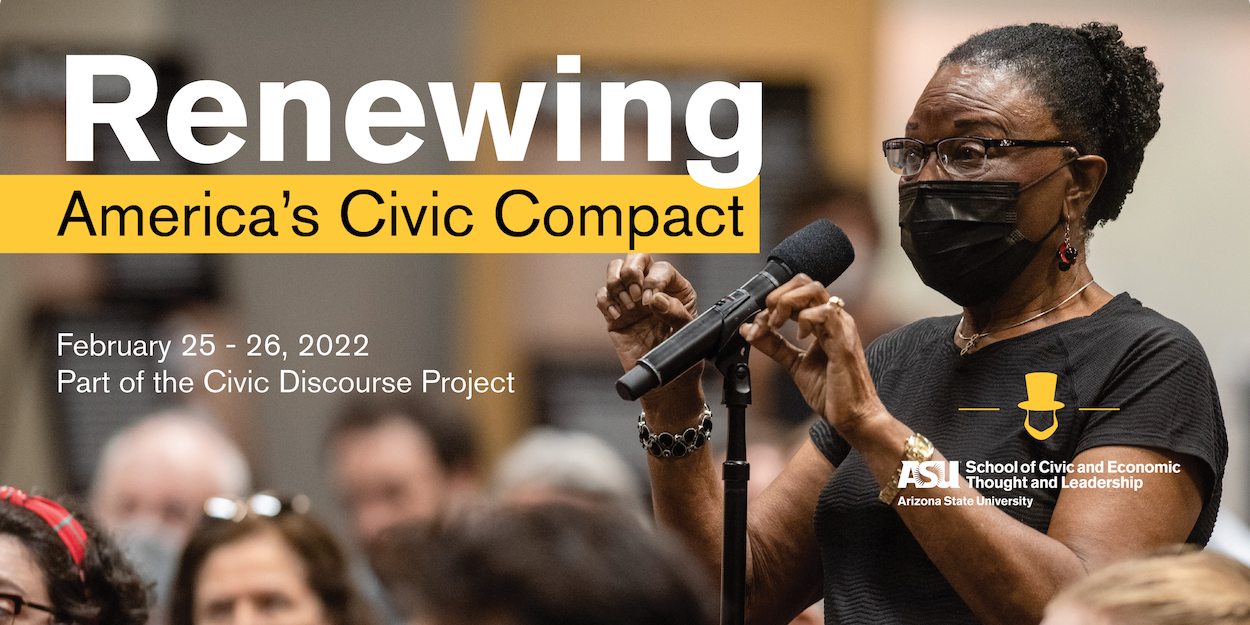ASU conference to draw inspiration from Abraham Lincoln to overcome political divisiveness

Kmele Foster, co-founder and executive producer at Freethink.
Americans are increasingly divided on everything from immigration to COVID-19 vaccines, from racial justice to foreign policy, and from voting laws to climate change. How can we engage civilly amid competing perspectives in politics and governance to rebuild the civic institutions that mediate our differences?
This question will guide an upcoming conference, themed "Renewing America’s Civic Compact," hosted by Arizona State University’s School of Civic and Economic Thought and Leadership on Feb. 25 and 26 at the Memorial Union on the Tempe campus.
The event will be held in person and streamed live by Arizona PBS on the school's YouTube channel. The school is accepting registrations here.
This year’s keynote speaker is Kmele Foster, Freethink co-founder and executive producer, who will discuss the limitations of modern social justice movements in the lecture “The World We Want to Live In: Racism, Race and the Dignity of our Individuality.”
“We look forward to discussing crucial challenges in the country during the conference,” said Paul Carrese, director of the school. “Our school is dedicated to promoting civil debates about pressing topics such as the current political polarization, which contributes to today’s civic crisis. By hosting forums for civil disagreement, we hope to help overcome this divide and to renew and enhance America’s capacity for self-governance.”
This divisiveness is also intellectual, and is experienced on college campuses across the country. Columnist, The Weekly Dish blogger and author Andrew Sullivan will join the discussion live via Zoom. He will speak on the impact of campus orthodoxy on American society, with an opportunity for an audience Q&A.
Conference attendees will also hear from some of the country’s top intellectuals and scholars, who are dedicated to reflecting upon America’s pressing social conflicts and the importance of civic education to finding a path on which Americans can move together to rebuild the public and private institutions to sustain civic, communal and professional lives.
“This year’s conference will offer an assessment of the challenges to American civic life and its institutions — including the university. We will also address how to rebuild the institutions and unity of our civil society," said Carol McNamara, associate director for public programs at the School of Civic and Economic Thought and Leadership.
The program is guided by Abraham Lincoln’s challenge in his first inaugural address on March 4, 1861: “We are not enemies, but friends. We must not be enemies. Though passion may have strained, it must not break our bonds of affection. The mystic chords of memory, stretching from every battle field, and patriot grave, to every living heart and hearth-stone, all over this broad land, will yet swell the chorus of the Union, when again touched, as surely they will be, by the better angels of our nature.”
The conference is part of the Civic Discourse Project, a series of lectures with some of the country’s most respected intellectuals and leaders. This year, Foster’s keynote address is also the culminating event of the three-part series “Can We Talk Honestly About Race?” The conference is co-sponsored by the School of Civic and Economic Thought and Leadership and ASU's Sandra Day O’Connor College of Law. It is supported by the Jack Miller Center, the Foundation Against Intolerance and Racism and the Scaife Foundation.
More Law, journalism and politics

Annual John P. Frank Memorial Lecture enters its 26th year
Dahlia Lithwick, an MSNBC analyst and senior legal correspondent at Slate, is the featured speaker at the School of…

The politics behind picking a romantic partner
A new study reveals the role that politics play when picking out a romantic partner — particularly for older adults.“Findings…

Tips to make tax season less taxing
When it comes to highly unpleasant experiences, filing taxes is probably up there with root canals — which is why people put off…
